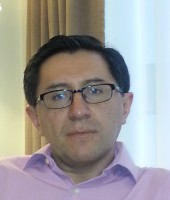Jorge Gómez Rendón
Jorge Gómez Rendón lectures in the School of Human Sciences at Pontificia Universidad Católica del Ecuador in Quito. His research has focused on language revitalization and documentation, language ideologies and language contact. He has developed documentation and revitalization projects of indigenous languages in Ecuador, Peru and Colombia and conducted sociolinguistic surveys with a view to designing language policies. He has been lately interested in the influence of language ideologies on language revitalization and linguistic rights in Latin America. His most recent research projects deal with the development of revitalization strategies for languages of indigenous immigrants in the cities and the design of ethnographically supported pedagogies for language revitalization.
Jorge Gómez Rendón joins the Paris IAS in September 2025 for a one-month writing residency.
Research topics
Language revitalization; language documentation; linguistic ideologies, interculturality.
What is language revitalization for? Indigenous languages as commons for environmental governance
Indigenous languages have become a target of policymaking over the last years as part of a worldwide movement for saving linguistic diversity in a context of rampant language endangerment. Still, there is no consensus among state agencies, scholars, and indigenous communities as to the ultimate end of language revitalization. State agencies approach language revitalization mostly from a culture-and-heritage perspective. Scholars most often privilege a linguistic diversity approach. Indigenous leaders and organizations may embrace either approach.
On the contrary, the views of indigenous activists reveal a radically different ideology of language revitalization. Such views are based on different ideas of what language is and what language is for, i.e. they rest on a different language ontology. Rather than considering languages as containers of information about biological diversity or cultural identity, indigenous activists consider them commons for participative environmental governance. In their view, language mediates local practices concerning resource use, transmits knowledge about local adaptations, constructs narratives of sustainable land and water management, and bridges effectively the realms of society and nature. The need for a paradigm shift based on alternative language ontologies will be made clear through a survey conducted among indigenous peoples in Ecuador with a view to positioning language revitalization as a vital part of the global environmental agenda.
Key publications
Jorge Gómez Rendón, Adriana Rodríguez, Fabiola Quintana, Elena Jarrin. Plan Decenal de Revitalización y Revalorización del Uso de las Lenguas de las Nacionalidades del Ecuador. Quito: Secretaría de Gestión y Desarrollo de Pueblos y Nacionalidades, 2024.
Jorge Gómez Rendón. "Raza, lengua y derechos lingüísticos", Sarance, 49, 86-110, 2022.
Jorge Gómez Rendón. "El contacto lingüístico: más allá de leguas, identidades y territorios", Revista Argentina de Historiografía Lingüística, XIII, 1, 25-50, 2021.
|
Online conference by Jorge Gómez Rendón (Pontificia Universidad Católica del Ecuador, Ecuador) as part of the "Paris IAS Ideas" series |
|
|
|
|

